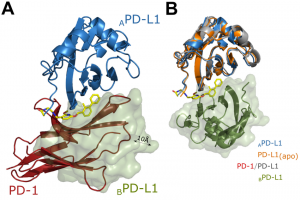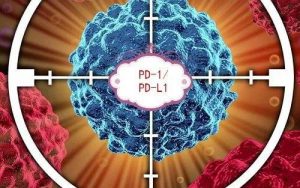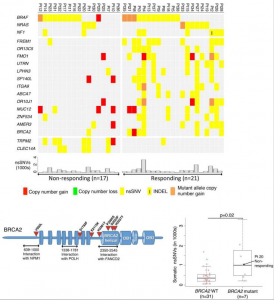PD-1 (programmed cell death protein 1), the programmed death receptor 1, is an important immunosuppressive molecule. Immunomodulation which targets PD-1 is of great importance to anti-tumor, anti-infective, anti-autoimmune diseases, and organ transplant survival. In recent years, scientists have made a number of achievements in the field of PD-1 research. We will share the relevant research here.

1.Science: Scientists confirm that intestinal microbes affect PD-1 / L1 antibody treatment for the first time! Gut microbiota and immunotherapy are convergence
DOI: 10.1126/science.aan4236
There may be a group of masters in our bodies. Yes, these masters are gut microbes. They are the highest frequency vocabulary in the world of science: why the study of microbiology has recently been a hot topic in the medical technology world? There is numerous study of intestinal microbes and diseases, obesity, diabetes, Parkinson’s disease, inflammatory bowel disease, autism and so on. There is a reader even leave a message: “The intestine is simply the second brain of the human body.”
Recently, researchers from the French Gustave-Roussy Cancer Institute and the MD Anderson Cancer Center at the University of Texas at Dallas published an article in Science, which has promoted the impact of gut microbes on the human body to new heights. The research found that the effects of the tumor immunity drug PD-1/L1 inhibitors are determined by the gut microbes, which is confirmed by treated patients.
2. Tumor DNA Immunotherapy Unlocks the Potential of PD-1 / PD-L1 Tumor Immunotherapy! The overall response rate of non-responders increased from 0% to 50%
OncoSec Presents Positive Phase II Data for ImmunoPulse IL-12 in Combination with Pembrolizumab Demonstrating a Best Overall Response Rate (BORR) of 50% in Predicted Anti-PD-1 Non-Responder Melanoma Patients
OncoSec Medical is a biotechnology company focused on the development of DNA-based oncology immunotherapy. Recently, the company updated data on two phase II clinical trials of ImmunoPulse IL-12 in experimental intratumoral DNA tumor immunotherapy (OMS-I100, OMS-I102). OMS-I100 is a monotherapy drug. The study conducted in 51 patients with metastatic melanoma who were treated with ImmunoPulse IL-12 monotherapy only. OMS-I102, a combined study, was performed in 22 patients with metastatic melanoma who were predicted by baseline biomarker data to not respond to treatment with PD-1. In the treatment patients receiving ImmunoPulse IL-12 was also treated with Merck’s PD-1 immunotherapy Keytruda (pembrolizumab, once every 3 weeks).
The published data confirm that ImmunoPulse IL-12, both monotherapy and combination with Keytruda, triggers key immune events that drive a cellular response that leads to an “inflamed tumor” that turn a ‘cold’ into a ‘hot’ tumor which is further enhanced by the combination of Keytruda.
3. Cell: For the first time, scientists from many countries have demonstrated that immunotherapy with oncolytic virus combined with PD-1 inhibitor can significantly improve the cancer response rate
Doi: 10.1016/j.cell.2017.08.027

The essence of collaborative operations means different forces in different fields, cooperate with each other, complement each other and work together for the same goal. Not long ago, an international team led by Antoni Ribias, Jonsson Comprehensive Cancer Center at the University of California, Los Angeles, applied the concept to the treatment of cancer.
Researchers first injected oncolytic viruses into melanoma, destroying the tumor microenvironment, and then systemic intravenous PD-1 inhibitors to activate and enhance the attack and killing of T cell for tumor cells. This is like encircling and destroy the enemy’s base, it first launches missiles for strategic bombardment and then sends Special Forces to conduct an all-out campaign.
The data of phase Ib clinical trial with advanced melanoma, conducted by scientists from the United States, Switzerland, Spain, and Australia, was far exceeded expectations. The treatment combined use of oncolytic virus and PD-1 inhibitor, 82% of patients with melanoma tumors subsided more than 50%, the objective tumor response rate increased more than 55% compared with single-agent treatment, and its safety has also been verified. The study was published in Cell.
4. PD-1 drugs can make white-hair of lung cancer patients become black
Doi: 10.1001/jamadermatol. 2017.2106
Noelia Rivera, MD, from the Autonomous University of Barcelona, Spain, believes that PD-1 / PD-L1 drugs have opened the door to a new era in cancer therapy, but the adverse effects of these drugs are not fully understood. For example, patients with lung cancer who accepted PD-1 / PD-L1 drug treatment developed skin-side effects – hair recolor (white to black). This is exactly the opposite of skin white spots seen in melanoma patients receiving PD-1 / PD-L1 medications.
During September-December 2016, 14 patients with lung cancer undergoing PD-1 or PD-L1 drug treatment at the dermatology department of Germans Trias i Pujol University Hospital in Barcelona, Spain, found adverse reactions to hair reversal during the follow-up period, the patients including thirteen men and one woman, with an average age of 64.9 years. From the results, 13 patients had gray hair scattered in white hair and 1 patient had a large area of hair reversal. In terms of the efficacy of the drug, 13 patients showed a better clinical response, at least stay in a stable status, and 1 patient discontinued treatment due to a life-threatening disease progression after 4 cycles of medication.
5. Cell: Why powerful anti-PD-1 immunotherapy does not work in some patients?
Doi: 10.1016/j.cell.2016.02.065

Mutational Correlates of Innate Sensitivity to Anti-PD-1 Therapy (Cell. 2016 Mar 24)
Recently, researchers from UCLA published a new research progress in the journal Cell. In this article, they used the method of omics to analyze the genomics and transcriptomic characteristics during anti-PD-1 immunity therapy in patients with metastatic melanoma.
PD-1 immune checkpoint blockade is a very effective and at the same time very prospect method of tumor immunotherapy, this method has very significant clinical effects for melanoma patients. However, there are also some patients with natural resistance to this method. The different responses of patients to anti-PD-1 immunotherapy may correspond to different genomics and transcriptomic features.
In the study, the researchers analyzed somatic mutations and transcriptomes of pre-treatment biopsies of melanoma patients in the hope of discovering some of the factors that may affect their natural sensitivity and resistance to anti-PD-1 therapy. The results showed that there was a correlation between the high mutation load and the improvement of patient survival rate. Meanwhile, there was also mutation enrichment of DNA repair gene BRCA2 in the tumor tissue of patients with therapeutic response effect.
To be continued…
Reference
- Gopalakrishnan V et al. Gut microbiome modulates response to anti-PD-1 immunotherapy in melanoma patients. Science. 2017 Nov 2. pii: eaan4236. doi: 10.1126/science.aan4236
- https://www.biospace.com/article/releases/oncosec-presents-positive-phase-2-data-for-immunopulse-il-12-in-combination-with-pembrolizumab-demonstrating-a-best-overall-response-rate-borr-of-50-percent-in-predicted-anti-pd-1-non-responder-melanoma-patients/
- Ribas A et al. Oncolytic Virotherapy Promotes Intratumoral T Cell Infiltration and Improves Anti-PD-1 Immunotherapy. Cell. 2017 Sep 7;170(6):1109-1119.e10. doi: 10.1016/j.cell.2017.08.027.
- Rivera N et al. Hair Repigmentation During Immunotherapy Treatment With an Anti-Programmed Cell Death 1 and Anti-Programmed Cell Death Ligand 1 Agent for Lung Cancer. JAMA Dermatol. 2017 Nov 1;153(11):1162-1165. doi: 10.1001/jamadermatol.2017.2106.
- Hugo W et al. Genomic and Transcriptomic Features of Response to Anti-PD-1 Therapy in Metastatic Melanoma. Cell. 2016 Mar 24;165(1):35-44. doi: 10.1016/j.cell.2016.02.065. Epub 2016 Mar 17.